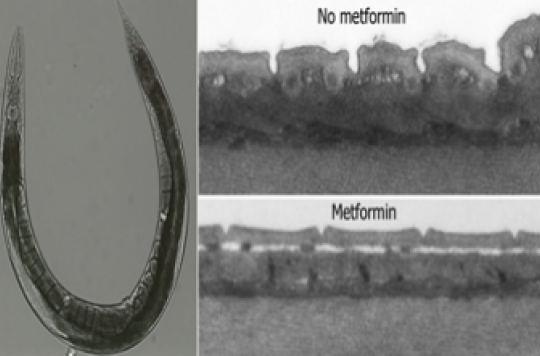The most widely used anti-diabetic, metformin, may also be beneficial against cellular aging. This is what a study carried out on a species of worm claims.

Metformin, anti-aging in addition to being anti-diabetic? Research is still at the worm, but it has shown the benefits of this drug against cellular aging. In PNAS, journal of the American Academy of Sciences, a Belgian team details the results of a promising study.
Harmful oxygen derivatives
Researchers have found that metformin influences the production of toxic oxygen derivatives (ROS), which the body releases naturally. It boosts the production of these molecules that are potentially toxic to DNA or proteins. It has long been thought that they were responsible for aging.
But at low doses, ROSs can also have beneficial effects, the researchers noted, since they make cells more robust. “As long as the amount of harmful oxygen derivatives released into the cells remains low, the effect is long-term beneficial for the cell. Cells use reactive oxygen particles to their advantage, before they can cause damage, ”says Wouter De Haes, lead author of the study. “Metformin causes a slight increase in the number of toxic oxygen molecules. We have found that it makes cells stronger and prolongs their healthy lifespan. “
Long years of research
Before reaching these conclusions, the researchers tested metformin on a small worm, the Caenorhabditis elegans. This species is ideal in the study of aging, because it only lives 3 weeks and exhibits very visible aging: “As they age, the worms shrink, wrinkle and become less mobile”, underlines Wouter De Haes. “But the worms treated with metformin show very little loss in size and don’t have any wrinkles. They not only age more slowly, they also stay healthy longer. “An operation close to the principle according to which” what does not kill us makes us stronger. “
Metformin as an anti-aging weapon is still in the field of research. On the one hand, because researchers recognize that the mechanism of action of the anti-diabetic remains unclear. Last year, a Quebec team suggested a possible explanation: metformin reduces the production of inflammatory cytokines, which activate the immune system, while recognizing that it is only one mechanism among others. On the other hand, human aging does not work the same as that of the worm. While waiting for a hypothetical transfer to humans, the drug remains at the center of attention: many studies have suggested its benefits against certain cancers and heart diseases.
.















